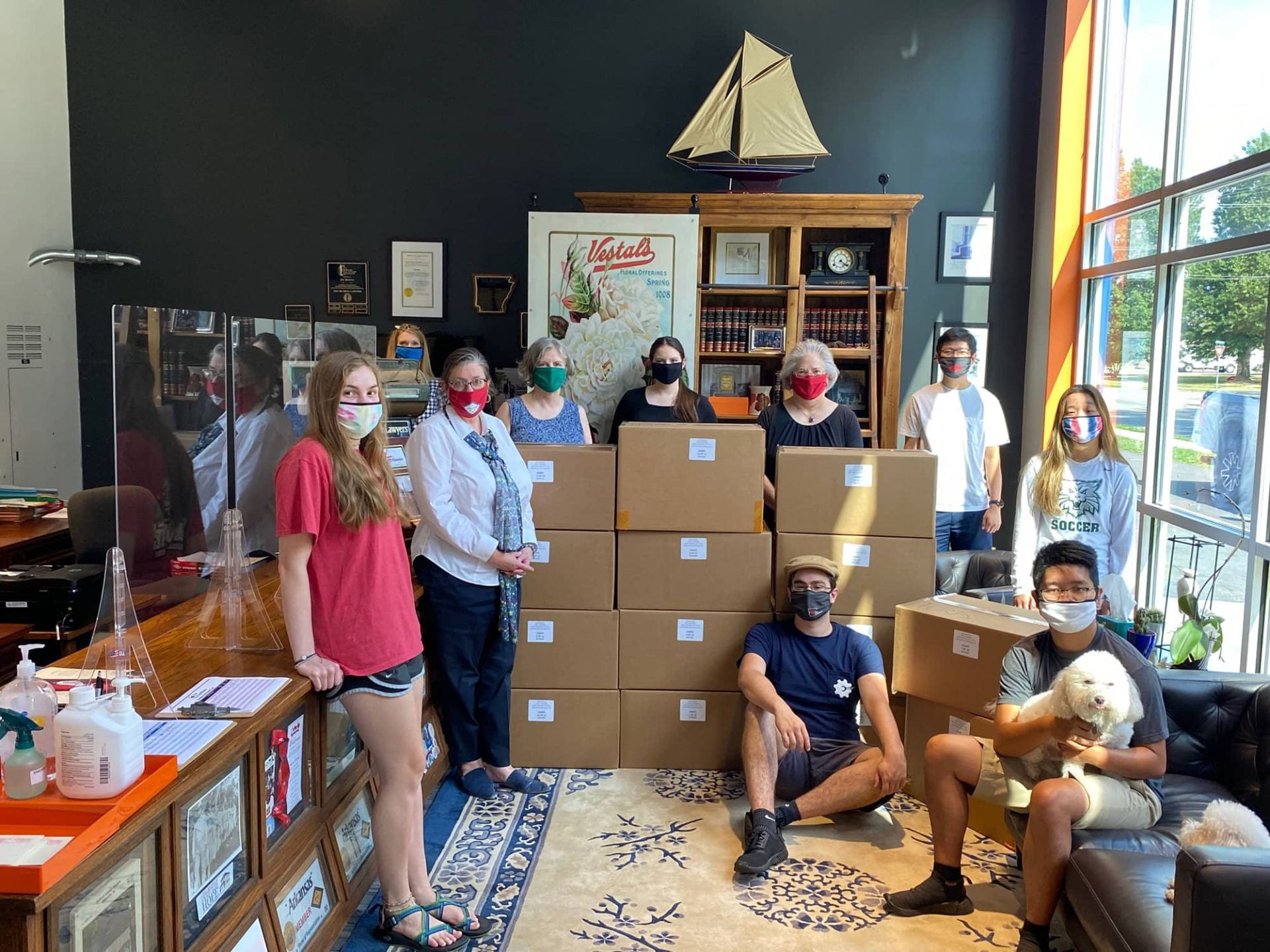
Adam Jackson responded to the COVID-19 lockdown by launching a company that manufactured masks.
Senior Adam Jackson, an information systems major with a blockchain concentration, spent his time during the pandemic starting and helping run a cloth mask and PPE company that provided more than 1,000,000 masks to 1,000+ clients in 34 states and overseas to U.S. troops. Jackson’s business has achieved solid success but faced some challenges as well; he shares five pro tips below.
“The secret of success is to be ready when your opportunity comes.” – Benjamin Disraeli
Startups have always been a major interest for me. From starting a real estate 3-D modeling company to inventing a maxillofacial medical device, I have never let my lack of knowledge in a given area stop me from pursuing an opportunity. When the pandemic hit in March of 2020, my mother, Lisa Ferrell, and I decided to approach a local clothing manufacturer, TY Garments, about repurposing their machines to produce cloth face masks. TY Garments had been producing clothing for Adidas and Reebok but had to halt production when their contracts were paused due to Covid-19.
After we signed the contract with TY Garments, the manufacturing of masks commenced. We named our company ARClothMasks and began working to get masks to as many businesses and schools as possible. Our goal was to be a mask supplier that clients could trust to deliver a safe product on time. Our competitive prices, short lead times and high-quality products helped us win customers across the country. To date, ARClothMasks has sold more than 1 million masks to more than 1,000 companies, hospitals, schools, and universities. From the University of Arkansas to the National Guard, our masks have reached the far corners of the nation and even overseas to our troops abroad. Since its founding, ARClothMasks has been through some ups and downs. I have compiled five of the most important lessons I learned through this experience that I hope will help you in whatever path you pursue.

Adam poses with members of the company he started with his mother, Lisa Ferrell (at left in white shirt).
- Utilize Your Network. We faced many obstacles as a new startup. Finding customers who will take the risk and work with you is always difficult at first. The way we solved this problem was by reaching out to people within our network of friends to jumpstart our business. Many PPE companies appeared out of thin air during the start of the pandemic. We had to make ours stand out above the competition through competitive pricing and short lead times. Most of the PPE companies in existence were either scams or could not deliver like we could. Word of mouth became our number one marketing avenue. Finding reputable PPE sellers was so difficult for procurement offices that they would instantly recommend us to their colleagues at different companies who were also struggling to discern the real and scam companies.
- Commit to “Clienteling.” This was a practice we adopted that involved giving the highest customer service ourselves and hiring staff who would excel at customer service. We trained on the best way to communicate and interact with clients because we knew that the biggest source of business is word of mouth by existing clients and contacts. We communicated with our clients extensively. With so many fraudulent PPE providers in the market, our clients greatly appreciate that we update them regularly on the status of their orders. We write thank you notes, send small thank you gifts and stay in regular touch. We also offer excellent client service to our vendors. For example, our partners at Nativ had to work long hours and on weekends to meet the logo needs of the University of Arkansas, Arkansas State and several other universities and schools. We dropped off ice chests of cold drinks for after-hours enjoyment. This emphasis on “clienteling” resulted in our clients and partners telling others about our business. In addition, it made our work so much more enjoyable. Happy customers are almost always a sign that your company is doing something right.
- Get The Website Built. The quicker your website is up and running the quicker you can start selling your product. Our customers varied based upon how many masks they wanted to purchase. We made sure that our website would efficiently lead people to the correct form based upon their needs. Having a good-looking website helped give our company credibility. Scam companies usually only had time to create poorly designed websites made to fool unsuspecting customers. We paid more upfront for a higher-quality website. This made things a lot easier when we wanted to integrate an online storefront later on for selling individual masks instead of bulk. The quicker you implement a system for managing orders, the more organized your company will be in the long run. And the more organized records are within the company, the easier it will be to submit taxes. Prioritizing the website gave potential customers an easy way to verify us as an authentic mask retailer.
- Have A Backup Payment Method. One of the toughest weeks in our company’s history was when we were banned from Square, PayPal and Stripe within seven days. We had started the company using Square because its easy-to-use user interface made it the most compelling. However, once the money began to flow in, our account got flagged as suspicious and consequently suspended. We adapted quickly to using PayPal but were banned there as well once invoices began to get paid. Stripe was the last straw and that too let us down. We ended up using our contacts at a local bank to connect us with an invoice platform, InvoiceASAP, that would not put a hold on our account. Selling products becomes worthless if you cannot take payments. Always have at least two ways to get paid. The last thing you want is for the payment to be the cause of a delay in a transaction.
- Be Prepared to Learn Anything. A college-level class can never truly compare to an on-the-job experience. My average day at work consisted of everything from accounting to marketing to finance. Many problems would arise where I found it more cost-effective to research and learn the solution myself rather than outsource the work to someone else. Learning how to file and submit monthly sales tax reports was something I taught myself how to do. Teaching myself how to properly file it saved us a lot of money in the long run. At first it was tedious and cumbersome, but nowadays I can complete the entire report in under three hours. I also taught myself how to calculate the maximum number of boxes I could fit in a U-Haul for deliveries. Hand delivering masks was always cheaper and more reliable than FedEx so we always tried to plan routes so that we could be as efficient as possible. Most of my desire to learn new methods and skills stemmed from the need to save money at all costs to maximize profit earnings. The more things I could do myself in house, the more things I could control.
